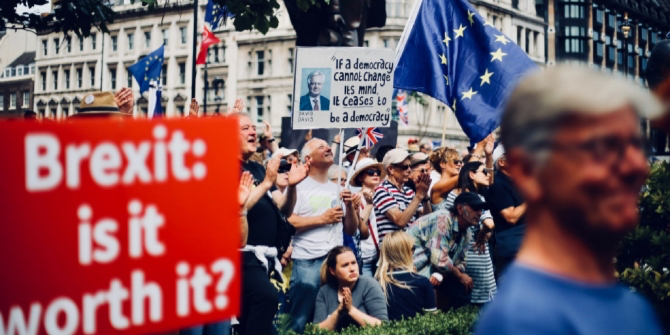
 Theresa May’s plan kicks the Brexit ‘can’ down the road because any Brexit deal will be inferior to the status quo, write Michael Ellington and Costas Milas (Liverpool).
Theresa May’s plan kicks the Brexit ‘can’ down the road because any Brexit deal will be inferior to the status quo, write Michael Ellington and Costas Milas (Liverpool).
Publication of the 585-page Brexit-deal document was immediately followed by swift criticism of Mrs May’s negotiating ‘outcome’ and a series of cabinet resignations. When academics are asked to examine a PhD student, they are sent a 200+ pages of a PhD thesis and are then asked to examine the candidate no less than a week later. How on earth everybody read the Brexit document in a few hours to…start firing remains a mystery to us.
In any case, it comes as no surprise that Mrs May put forward a very vague deal, which, in essence, kicks the Brexit ‘can’ down the road. In our view, this is because any concrete Brexit deal will be inferior to the current status quo. She knows this very well and she is not willing to face the electoral blame.
In extending the Brexit transition to…20XX, Mrs May appears to believe that a version of the so-called ‘Chequers plan’ works. Recall that the Chequers plan proposes tax or tariff-free trade with the EU, while leaving the UK free to pursue trade deals outside the EU. The plan suggests that the UK would collect tariffs on the EU’s behalf for any goods entering the country but destined to be sent on to EU countries. The 585-page document is not clear on whether we will eventually become the ‘tax collector’ of the EU.
 Featured image credit: Photo by Ilovetheeu, under a CC-BY-SA-4.0 licence.
Featured image credit: Photo by Ilovetheeu, under a CC-BY-SA-4.0 licence.
In any case, this very plan has already been indirectly torn apart by the publication of the 2018 Global Competitiveness Report. This report, published by the influential World Economic Forum, suggested that, among 140 countries, the UK economy lost competitive ground as it dropped down from 6th place in 2017 to 8th place in 2018. The report also noted a deterioration in the UK ‘product market’ environment. The product market environment refers to domestic competition and trade openness; the latter relating to trade tariffs, complexity of tariffs and efficiency of the clearance process.
Since the UK is already witnessing a deteriorating performance in this very area, why on earth are we insisting on a version of the ‘Chequers plan’, which proposes an even more complicated clearance process? Even worse, why on earth Germany seems (?) to agree on us doing the clearance process for them when they are already ranked the best country in the world in doing this job, while we are ranked ten places behind them?
The reality, however, of the 585-page document and the subsequent resignations is that prolonged uncertainty is already ‘killing’ our economy. We see evidence of this in Figure 1,which plots together business investment growth in the UK and economic policy uncertainty. Economic policy uncertainty is constructed based on newspaper articles regarding policy uncertainty from The Times and The Financial Times.
Figure 1. Business investment growth and policy uncertainty in the UK, 1999-2018 (quarterly data)

Source: ONS and Policy Uncertainty
Notice from Figure 1 that policy uncertainty, which increased rapidly on our way to the EU referendum, recorded a notable decline only after early 2017, when Theresa May decided to trigger Article 50. Indeed, by eventually triggering Article 50, our government was ‘forced’ to start negotiating with our EU partners in a constructive manner. In fact, Figure 1 identifies a clear negative relationship between business investment growth and policy uncertainty. Higher policy uncertainty makes firms less willing to invest in the UK economy, which takes its toll on our future economic prospects. In fact, according to the Confederation of British Industry, 80 per cent of businesses say that Brexit affects negatively their investment decisions.
Critics of Mrs May think that we can get a ‘better’ deal. On what grounds really? Our EU partners have long realised (and witness this even more based on today’s resignations) that our government appears in ‘disarray’. Why on earth would they be willing to concede more when we are in such a weak negotiating position?
The point is that we are sleep-walking to a ‘no-deal’ Brexit. Ending up with a no-deal Brexit will push the Bank of England to the limit. Backed up by our brand new research, the Bank’s policymakers will be forced to stave-off the adverse impact of a huge fall in confidence and business investment through monetary stimulus.
It won’t be the first time. Indeed, Mark Carney and his Monetary Policy Committee (MPC) fellows had to step in to ‘save the day’ the morning after the referendum date when David Cameron was too busy resigning as Prime Minister. The hope is that they will be spared from doing the same job again.
So what are the alternatives? Mrs May could take her Brexit deal to the people’s vote. That is, call immediately for a referendum on her Brexit deal: her deal versus the current status quo as an alternative. No more Brexit games. Going back to the negotiating table in the hope that the same negotiators will come up with something (slightly) more meaningful is a folly. Our economy cannot afford any more Brexit games. As simple as that.
This article gives the views of the authors, and not the position of LSE Brexit, nor of the London School of Economics and Political Science. It first appeared on LSE Business Review.
Michael Ellington is Lecturer in Finance at the University of Liverpool.
Costas Milas is Professor of Finance at the University of Liverpool.







I was interested to read an article in the Irish Times with the headline ‘Gloss comes off Irish Government’s Brexit backstop victory’.
https://www.irishtimes.com/news/world/brexit/gloss-comes-off-irish-government-s-brexit-backstop-victory-1.3699314
It stated that ‘ The Conservative revolt against Theresa May’s proposed Brexit deal has taken the gloss off the Irish Government’s happiness at securing a draft treaty that met and exceeded its hopes’.
If it all goes pear shaped for the Irish Government, then they only have themselves to blame. They knew Mrs May was in difficulty but they didn’t cut her any slack and instead went for something beyond their expectations. How dumb is that?
Every text on negotiation tells you that a good negotiation is one where both parties come back with something. The EU doesn’t understand this principle. It screwed up its negotiations with Cameron and it has learnt nothing from that experience.
The imponderable here is what would have happened if the country and cabinet had shown unity and put themselves solidly behind the Brexit negotiations.
If that unity had happened and, despite that, the outcome was not dissimilar to what we see now then many Leavers would now concede that perhaps we should remain. But that is not what happened. The Remainers in the country and the cabinet did their best to undermine the negotiations and now they are saying: look the negotiations didn’t go very well, we told you so.
To me leaving was not solely about democracy, but now it is. If we remain in the EU now, then it means that we are giving carte blanche to George Soros, Tony Blair, Alistair Campbell and the like to cherry pick our democrat votes and suppress those which they don’t like. Not only would we be ruled by autocrat elite in Brussels but we would be pushed around by the elite here. If we are left with a choice of Hard Brexit or Remain, then I will choose true democracy whether that means economic hardship or not. In any case the Treasury predicted a rise in unemployment of 500,000 to 800,000 in the immediate aftermath of a Leave vote and that didn’t happen, so we cannot trust the predictions of economic Armageddon this time.
@Teejay: “The imponderable here is what would have happened if the country and cabinet had shown unity and put themselves solidly behind the Brexit negotiations. ” Surely this is to live in fantasy land? Those who voted Leave knew, or should have known, that a victory for the Leave side would not heal the divisions in the country. Someone who complains that Leave would be working out fine if it weren’t for all those Remoaners is a bit like a Marxist-Leninist complaining that the Soviet Union would have worked out just fine if it hadn’t been for all those reactionaries who didn’t get behind it.
“Those who voted Leave knew, or should have known, that a victory for the Leave side would not heal the divisions in the country.”
But divisions as we have then now did not exist to such an extent before the referendum. We have elections, the losing side moans a bit and we move on with a certain amount of sniping as situations develop. The same used to happen in the US until Obama won, then the Republicans decided to implement all out war whilst blaming Obama for being divisive. As soon as the referendum result was known the Remainders decide to use the Republican handbook and the vitriol started. Leavers were racist, dumb and too old to deserve a vote. It wasn’t just fringe extremists playing this tactic it included such figures as the Leader of the Liberal Democrats.
Personally, I regret that the Leave side weren’t more aggressive in their response. Every time employment figures came out they should have been compared to the Treasury predictions. At every budget, the policies should have compared to Osborne’s £30 billion of taxes and spending cuts. Every time monthly house price data was announced they should have been compared to the daft predictions of the Treasury short term report. I think these comparisons should have been made not to highlight the gross deceit of Project Fear but because the inaccuracies raise serious constitutional issues. There is a strange asymmetry here. Leavers haven’t highlighted the gross discrepancies between the Treasury short term reality whilst Remainers compare reality to some made up alternative and ever more bizarre predictions.
It is to your credit at least that you don’t try to deny that the Remainers have done their best to undermine the Brexit negotiations, but please don’t follow the Republicans model and blame Leavers for the divisiveness and vitriol that the Remain side has introduced into British politics.
@Teejay: I’ve been living outside the UK too long to vote in 2015, so I’m not officially a Leaver or Remainer. I’m tempted to say “a plague on both your houses”. I could draw up a long list of dishonest assertions on both sides. I just hope that one day the UK can get back together again. There are plenty of other problems to solve, for example the UK’s lack of social mobility. It shouldn’t be controversial to say that every child born in the UK who works hard and follows the rules should be able to have a fulfilled life in a happy, secure, environment, but that isn’t the picture I get of the UK today. Maybe it’s more fun debating Brexit but there are more important issues.
Teejay as is ussual you are right.
Maybe it is that the more mature people have learned to keep our poweder dry?
Beware the sleeping lion!
My feelings are that I have had my say and 17.199,999 million people agreed with me.
We were asked a simple question ( just as well for me )
Stay or leave, not should we partly stay, not should we partly leave.
The question was answered
We all expect our elected representatives to act on the instruction.
Should they not, then the sleeping lion will awake and there will be consequences.
Not least that fact that we can vote them out of their cushy office.
A bit like cleg ??
@Alias,
We can agree that there needs to be better social mobility. We can perhaps agree that Free Movement doesn’t help social mobility for youngsters working in the UK. We will have to disagree on whether or not Free Movement is detrimental for social mobility in the UK.
I have watched this forum and in my uneducated way I also predicted in other academic posts that the disrupters would make life and the outcome much more difficult and result in a poor deal.
The two gents above are absolutely right.
There I told you so is pouring out of Ann sour face, Tony gun happy Blair, and his previous advisor who felt that the stupid leavers should be shot along with iraqi’s.
I have hope that all
This ends in a walk away, no deal.
That would be the best outcome from where we are at this moment in time.
Shame on those who cannot accept democracy and look towards dictatorship.
The day will
Arrive when 17.5 million voters will never vote again because our masters in Europe will take no head anyway.
Now that is dangerous!!!!’
For information purposes
The people who have or will sacrifice the U.K. to Eu slavery are
Mandekdon eu pension £673,000 pa
Kinock £1,7m Eu pension
Hedletine £90,000 pa farming subsidy
Tugendhat £760,000 Eu pension
Patten £770,000 Eu pension
Ashton Eu pension 230,000 Eu pension
Etc etc etc
You fools, you’ve been had!!!!
I note Brexits here continuing to claim the EU is anti democratic as an excuse to withdraw from co-operation with our neighbours..
Membership of the EU is voluntary in the same way that Nato membership is voluntary… We place our troops in Nato under the command of foreign Nato generals without being under a dictatorship..
The democratic governments of the EU appoint the Commission in the same way they appoint their own national civil servants.
The EU Parliament is democratically elected.. Nigel Farage is a member… And the UK was a prime opponent of giving the EU Parliament more power..
If the EU was to fully intergrate… Then just as with Wales in the UK, it would still be democratic..
Yellard
If we were to withdraw from Nato.
Would we expect the negotiated withdrawal to include continued contributions?
Maybe a cash payment of billions?
Or should we expect that we should pay but of coarse the umbrella be removed?
I am a golfer
If I leave should I contribute to the secretaty’s pension thereafter?
Should I pay for club house repairs thereafter?
If I pay all that should I expect to still use facilities?
If I were told no!
I know what I would say!
If would opt for a hard ball!
“If we were to withdraw from Nato.
Would we expect the negotiated withdrawal to include continued contributions?”
Dennis, I can answer your question. France relinquished NATO membership for a period. It paid nothing to withdraw.
Thank you.
That’s my point entirely.
The French have been a huge driver in Brexit negotiations and my memory tells me that the EU wouldn’t even discuss leaving terms until we agree payments.
That’s one of my gripes with EU.
Do as I say not as I do!!
In business I need to ask why internet only retailers can undercut me with my bricks and mortar,
Franctions of overheads..
If I even discuss it I can be fined serious money effectively put out of business.
Since when did we loose freedom of speech?
Yellard
The European Council and the Council of Ministers (the two bodies where member countries meet) still hold many sessions in private or only partly make their records public, which makes it difficult to always know who has said what, or how individual countries have voted;
Much implementation of EU laws still happens under the opaque ‘comitology’ system,
The European Parliament lacks some of the powers normally associated with national parliaments. It cannot formally propose new laws or raise taxes, for example;
There is no clear alternation of power. While different groups might gain more seats in the European Parliament, this is not necessarily matched by similar changes in the ‘executive’ branches of the EU—the European Commission, and the national governments in the Council;
The complexity of the system also makes it hard to ensure that EU funds are not misspent;
And no clarity or accountability on budgets or spending.
The Eu parliament cannot raise new laws or proposals, these are raised by the the bureaucrats in Brussels, MP’s just rubber stamp the decisions.
There is a mechanism within the EU for citizens to formally request changes, however since the formation of the EU, not one has been debated or enacted since the inception of The treaty of Rome.
Donald Tusk idea of democracy is to suggest that it’s not too late for a second referendum, it also possible for the U.K. to ignore the referendum since it was only advisory.
Just like France who voted no to the treaty in 2005 but were ignored.
Ireland voted no to the treaty in 2008
But both countries were sent back until they get it right.
Currently four out of five top positions are held by Germany, the only one not is up for nomination, that is being proposed to Angela Merkel
Junker was the only candidate in 2017 for EU president, he was unopposed and the vote was in secret by the EU MP’s
It is no secret that the top positions held by Germany, junker, Tusk, Merkel, and Macron all are calling for ever closer Europe, under the heading of United States of Europe.
Hmmmmm!!!!
Democratic?
I think not!!!!